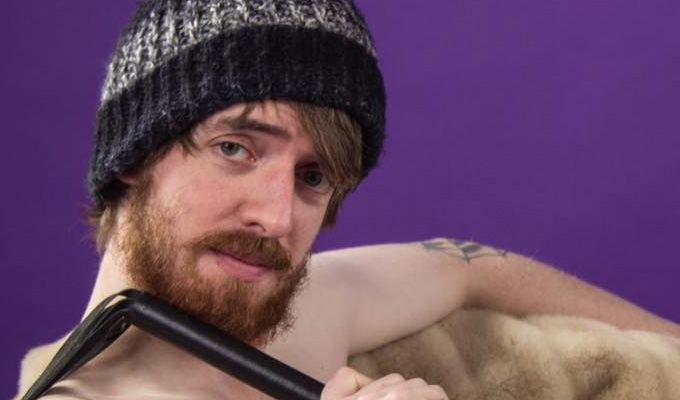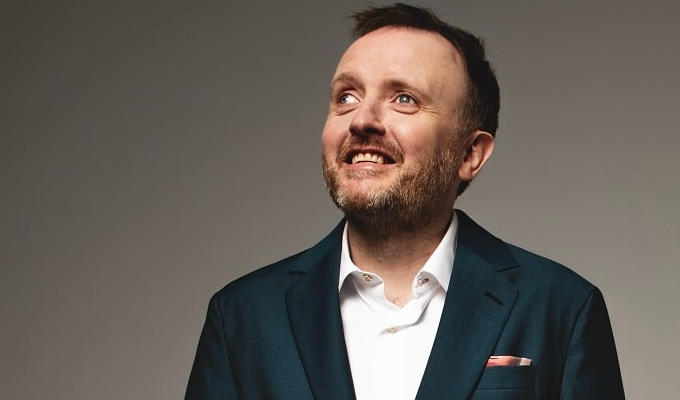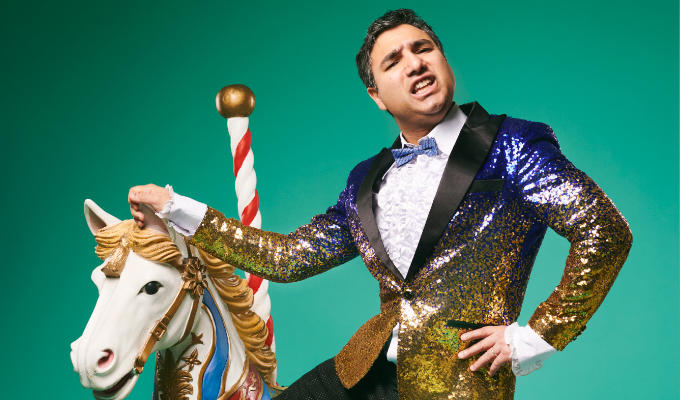
Scottish Comedian Of The Year 2016 final
Note: This review is from 2016
Gig review by Jay Richardson at The Barrowlands, Glasgow
Despite delivering one of the stronger line-ups in its ten-year history, the Scottish Comedian of the Year final couldn't be said to be a triumph for diversity, with the contest almost exclusively awkward young, white men lamenting their troubles with women and terrible employment prospects.
This feature was especially marked in the first section and exemplified by opening act, Christopher MacArthur Boyd. Sauntering on with the confidence of having been last year's runner-up, and performing in his native East End of Glasgow, his was a polished set of beta male woes about a socially inappropriate ex-girlfriend, hapless sexting and friction with his more right-wing parents. With his short, bespectacled stature he projects a convincing mix of pipsqueak pique and impotence but lost some momentum by comparing his domestic circumstances to the Scottish Referendum of 2014 – a curious decision given that with a slight tweak he could have updated it for Brexit.
Next up was Ally Houston, a self-consciously leftfield act who's attaining greater consistency, even if he still baffles every now and then. Sharply attired and with a surprise opening visual gag, he was one of the only comics to truly embrace the occasion, engaging with the crowd and incorporating them into his contrived, anti-comedy wordplay. Delightfully 'owning' and exaggerating his poshness in this rascally, rough and ready part of Glasgow, his brand of prop comedy and musical whimsicality, undercut with a certain menace, is an acquired taste. But it unquestionably leaves an impression and he shared third place in the judges' estimation.
As the most conventional stand-up of the opening quartet, Marc Jennings suffered by comparison. An astute observer who's accomplished at channelling his frustrations from still living at home and enduring a call centre job into a wider social critique, he's got some sharp lines but they don't always connect. Adroitly comparing Scottish voters' impact on the US and UK elections, their football supporter-like relationship with the Labour party and the euphemistic disingenuousness of being 'stood down' from your job, his Millennial angst feeds into his delivery and his routines strain to bridge his clever punchlines, with the result that they don't always have the impact his writing deserves.
Still a relative newcomer, Stuart McPherson impresses with his calm, relaxed ease on stage. His introduction, about appearing a little 'dry' is exactly that. But it segues nicely into his parents' contrasting worldviews and he has a wry eye for life's absurdities, pedantically picking apart the brand name of the chemist Semichem and artfully exploiting similarities between religious advertising, stand-up self-promotion and internet clickbait. Such original trains of thought are followed by seemingly more familiar musings on breaking up with a girlfriend and reluctance to exercise, but again, he finds new things to say. Understated but assured, he did enough to share third place with Houston.
Another diminutive comic bemoaning his lack of luck with the ladies, Stephen Buchanan took a different tack to most of the others by quoting the chat up lines of his lothario mates, allowing him to explore a laddish streak of humour while simultaneously distancing himself from it. A confident presence at the mic, he's got some witty reflections on his height alongside more workaday lines, with the occasional standout visual metaphor unreflective of a competently delivered but none-too-memorable set.
Since dropping his macabre Rosco McSkeleton character, Rosco McLelland has developed fast as a storytelling comic and impressed with just how quickly he grabbed the interest of the crowd here. Opening with a well-judged tale of witnessing an eccentric come a cropper on Sauchiehall Street, with his unkempt beard, gruff voice and slouched shamble, McLelland's current persona is that of a droll philosopher, rolling with the punches life throws at him. There are unquestionable shades of Billy Connolly to his style now, a worthy aspiration. And his main story is a cracker, with social media catching him in a minor indiscretion that enrages his jealous girlfriend, their escalating attempts to win the ensuing argument bringing their relationship to the brink of collapse. With a sense of jeopardy, it's a yarn that really suckers you in and there's an exquisite payoff. Likewise, he shares the funeral of his grandmother and his discombobulated reaction, with the engaging attention to detail offset by some lovely, slightly surreal touches. A worthy winner, he was the unequivocal choice of the five judges.
If only by default, at 39, Leo Kearse was the older statesman of the contest. And his experience showed with a solid, punchily consistent set that on another night might have scooped the prize. Eschewing the puns that have made his name, he delivered surprisingly imaginative takes on being 6'7 and the well-worn novelty of shopping at Lidl, before moving assuredly into the realities of sex for a mature hightower like himself. A little filthy, a little battle of the sexes grit, but shot through with self-deprecation and by some distance the highest gag rate of the evening, it was followed by a memorable image of the perils of sunbathing in the nude for male genitalia. His closing routine about the frustrations of online train booking rather over-egged the pudding and was less distinctive but clearly struck a chord in the room. He deservedly took second place.
Like Houston, Andrew McBurney has to be commended for taking a risk. Arguably he was stringing together a couple of one-joke set-pieces but he truly committed and on his own terms, nailed them. Slowly shuffling on, downcast, explaining how his recent break-up might inhibit his performance, his meta-commentary on his dodgy gags were howls of pain at his loneliness. Not without laughs, there's a bludgeoning brutality to his darker, more tasteless lines but the sadsack character is difficult to truly engage with, even if he plays on his musical moroseness with deliberately contrived sound effects. Without truly knowing how to relate it to what's gone before, McBurney also retains an incredible routine up his sleeve for his finale, his trademark impersonations of the African-American school of Def Jam comedy. All the more uncanny for emanating from a pasty white, slightly overweight young Scotsman, they're brilliantly observed. But he didn't deliver these with as much panache as I've seen in the past and it's a slightly baffling non-sequitur.
Michael Hollingworth has obvious promise and knows how to craft a joke but currently resembles a Miles Jupp tribute act. With gags on his privileged upbringing so close to that of the early, Laird of the Manor phase of Jupp's career, there's also more than a hint of Simon Evans's superciliousness towards the lesser classes. In a proudly working-class city like Glasgow, that can be a strong combination if you can pull it off, and Hollingworth does for a sizeable chunk of his set. He doesn't have the subtlety yet of those established comics or the nerve to be really aloof or abrasive, but you can see how he might develop in this vein before finding his own voice.
The only comic to play high-status, coming out with an affected arrogance and repeating his catchphrase, 'get it up ye, that's a belter!', self-declared lad Martin Bearne was obviously out of his depth. With crude puns and creaking pullback-and-reveal gags allied to a purposely creepy misogyny, Bearne's bravado was a wafer-thin disguise for a lack of decent material. Still, the manner in which he repeated that accursed catchphrase and blasted through charmless routines about his 'Wank Shed' and other sinister voyeurisms in the face of overwhelming indifference was at times remarkable to behold.
Sam Lennox fared a little better, an actor-turned-comic from Edinburgh, he archly identified the prevailing impression in the Barrowlands that 'everyone on stage tonight is some lonely, single cunt'. He wasn't about to depart from that template with a frankly inexplicable song, Love, that swung from twee to gross illegality and never came close to cohering into a joke. Whether his future is in stand-up is open to debate but he cuts a striking figure and there was wit in his confession as to why a straight man would sign up to Grindr. His version of Highway To Hell amused too, even as he ground the humour into the dirt by stretching it out way too long. With a slightly manic intensity, there was no doubting his commitment to his performance either.
Review date: 29 Nov 2016
Reviewed by: Jay Richardson
Reviewed at:
Glasgow Barrowlands Ballroom






